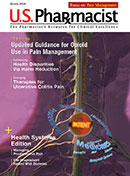US Pharm. 2014;39(1):1.
Over the years, retail pharmacists and the profession of pharmacy in general have endured many attacks and criticisms. The objection that seems to surface most often at social gatherings is that all pharmacists do is pour medication from one bottle into another. Condemnations such as these are generally the result of ignorance about the profession among consumers who know little or nothing about the inner workings of a pharmacy and the pharmacist’s role in filling their prescriptions. Public relations campaigns extolling the position of the pharmacist in today’s complex healthcare continuum have been nearly nonexistent. Only recently, thanks in large part to the debate over the Affordable Care Act and the part pharmacists should play in ensuring its success, have pharmacists gained any repute as being an integral part of this nation’s healthcare system.
Recent negative publicity regarding a few compounding pharmacies that dispensed tainted medication, ultimately causing serious illness and death in some patients, might have been assumed to perpetuate the unfavorable image of pharmacists in some consumers’ minds, casting a broad shadow of doubt on the profession. Apparently, this was not the case. According to the latest Gallup Poll on Americans’ view of honesty and ethical standards in professions, pharmacists were once again ranked near the top of the list, second only to nurses.
However, while the pharmacist’s image as an ethical and honest professional seemingly remains intact, lawmakers addressed the issue of exactly who is policing pharmacy, particularly compounding pharmacies, and once again called upon the FDA to step up its efforts in determining the perilously close relationship of compounding and manufacturing. A year after Congress began investigating a compounding pharmacy in Massachusetts that had produced deadly compounded products, it passed a new law that essentially cleans up the conflicting language on compounding in the existing federal Food, Drug, and Cosmetic Act and creates a new, voluntary process for facilities that compound sterile products under the supervision of a licensed pharmacist. The latter produces tighter controls on these facilities by requiring them to send data to the FDA, pay user fees, and submit to FDA inspections.
On the surface I support such a law, but it raises a question: Is this just the beginning of the FDA policing all licensed pharmacies, a role that has traditionally been the domain of the state Boards of Pharmacy? Many Boards of Pharmacy are not adequately funded to oversee the thousands of licensed pharmacies under their jurisdiction. Unfortunately, this can lead to fewer inspections and potentially troubling results statewide. A recent story in the North Carolina media asserts that a state audit uncovered that “more than one-third of the pharmacies operating in North Carolina haven’t been inspected by state regulators in at least four years.” This is a disturbing news item, particularly if the same is also happening in other states. Retail pharmacists and pharmacy owners need to police themselves better. Federal intervention will only further restrict the practice of pharmacy. Consumers already trust their pharmacists; it is important that they trust where they purchase their prescriptions as well.
To comment on this article, contact editor@uspharmacist.com.






